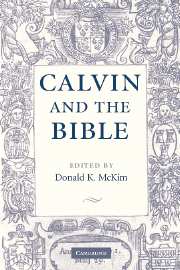Book contents
- Frontmatter
- Contents
- Notes on contributors
- Preface
- List of abbreviations
- 1 Calvin as commentator on Genesis
- 2 Calvin as commentator on the Mosaic Harmony and Joshua
- 3 Calvin as an interpreter of Job
- 4 Calvin as commentator on the Psalms
- 5 Calvin as commentator on the Prophets
- 6 Calvin as commentator on the Synoptic Gospels
- 7 Calvin as commentator on the Gospel of John
- 8 Calvin as commentator on the Acts of the Apostles
- 9 Calvin as commentator on the Pauline epistles
- 10 Calvin as commentator on Hebrews and the Catholic Epistles
- 11 John Calvin as an interpreter of the Bible
- Index
5 - Calvin as commentator on the Prophets
Published online by Cambridge University Press: 09 November 2009
- Frontmatter
- Contents
- Notes on contributors
- Preface
- List of abbreviations
- 1 Calvin as commentator on Genesis
- 2 Calvin as commentator on the Mosaic Harmony and Joshua
- 3 Calvin as an interpreter of Job
- 4 Calvin as commentator on the Psalms
- 5 Calvin as commentator on the Prophets
- 6 Calvin as commentator on the Synoptic Gospels
- 7 Calvin as commentator on the Gospel of John
- 8 Calvin as commentator on the Acts of the Apostles
- 9 Calvin as commentator on the Pauline epistles
- 10 Calvin as commentator on Hebrews and the Catholic Epistles
- 11 John Calvin as an interpreter of the Bible
- Index
Summary
COMMENTARY CONTEXTS
Calvin's “commentaries” on the prophetic books of the Old Testament were among the last of his expository publications. The series began with a Commentary on Isaiah, first published in 1550, but subsequently revised in 1559. Then (after Genesis in 1554 and the Psalms in 1557) followed expositions of Hosea published in 1557, of the Twelve Minor Prophets in 1559, of Daniel in 1561, of Jeremiah and Lamentations in 1563, and (published posthumously) of the first twenty chapters of Ezekiel in 1565. Of these only the exposition of Isaiah is a “commentary” in any modern sense of the term. The others were not written by Calvin, but were compiled by his friends from lectures he gave in the Academy in Geneva. They are transcriptions, published as Praelectiones, not Commentarii. (Indeed, strictly speaking, not even the so-called Commentary on Isaiah was “written” by Calvin. It too was written up for him from his lectures by a friend, although, unlike the later “Lectures,” it was not intended to be a transcript of them and is evidently addressed to readers, rather than hearers.)
Calvin's “commentaries” on the Old Testament Prophets thus stand apart from his other published expositions of Scripture. With the possible exception of the Isaiah commentary, their character as lectures (and the particular nature of the audience to whom they were addressed) must be allowed to inform the reading of them.
- Type
- Chapter
- Information
- Calvin and the Bible , pp. 107 - 130Publisher: Cambridge University PressPrint publication year: 2006
- 7
- Cited by

